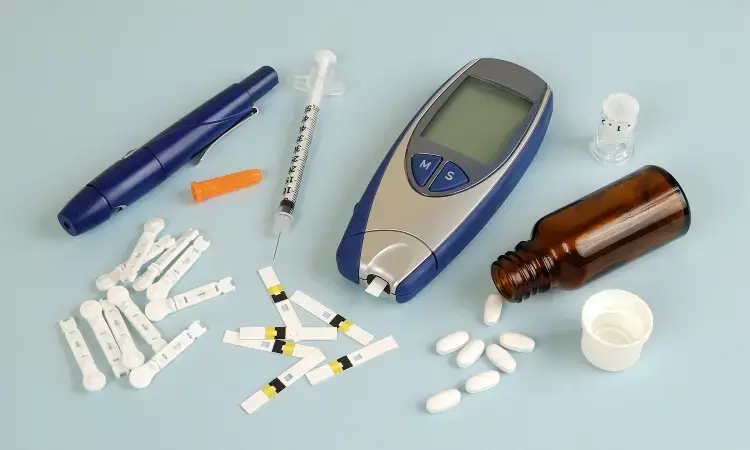- Home
- Medical news & Guidelines
- Anesthesiology
- Cardiology and CTVS
- Critical Care
- Dentistry
- Dermatology
- Diabetes and Endocrinology
- ENT
- Gastroenterology
- Medicine
- Nephrology
- Neurology
- Obstretics-Gynaecology
- Oncology
- Ophthalmology
- Orthopaedics
- Pediatrics-Neonatology
- Psychiatry
- Pulmonology
- Radiology
- Surgery
- Urology
- Laboratory Medicine
- Diet
- Nursing
- Paramedical
- Physiotherapy
- Health news
- Fact Check
- Bone Health Fact Check
- Brain Health Fact Check
- Cancer Related Fact Check
- Child Care Fact Check
- Dental and oral health fact check
- Diabetes and metabolic health fact check
- Diet and Nutrition Fact Check
- Eye and ENT Care Fact Check
- Fitness fact check
- Gut health fact check
- Heart health fact check
- Kidney health fact check
- Medical education fact check
- Men's health fact check
- Respiratory fact check
- Skin and hair care fact check
- Vaccine and Immunization fact check
- Women's health fact check
- AYUSH
- State News
- Andaman and Nicobar Islands
- Andhra Pradesh
- Arunachal Pradesh
- Assam
- Bihar
- Chandigarh
- Chattisgarh
- Dadra and Nagar Haveli
- Daman and Diu
- Delhi
- Goa
- Gujarat
- Haryana
- Himachal Pradesh
- Jammu & Kashmir
- Jharkhand
- Karnataka
- Kerala
- Ladakh
- Lakshadweep
- Madhya Pradesh
- Maharashtra
- Manipur
- Meghalaya
- Mizoram
- Nagaland
- Odisha
- Puducherry
- Punjab
- Rajasthan
- Sikkim
- Tamil Nadu
- Telangana
- Tripura
- Uttar Pradesh
- Uttrakhand
- West Bengal
- Medical Education
- Industry
Uptitrating standard dose of teneligliptin fails to improve blood sugar in type 2 diabetes: JAPI

Mumbai, Maharashtra: Increasing the dose of teneligliptin from 20 to 40 mg at 3 months did not result in statically significant improvement in glycemic parameters in patients with type 2 diabetes, a recent study has stated. The study appears in the Journal of the Association of Physicians of India.
The fasting blood sugar (FBS) and postprandial blood sugar (PPBS) showed a modest reduction of f 14.6 and 14 mg/dL, respectively at 6 months, but no change was observed in the HbA1C.
The study was undertaken by Vijay Panikar, Consultant, Lilavati Hospital & Research Centre, Mumbai, Maharashtra, India, and colleagues to study the efficacy of up titrating the dose of Teneligliptin from 20 to 40 mg in patients with type II diabetes mellitus.
For this purpose, the researchers conducted a retrospective, comparative analysis of 853 patients with type 2 diabetes (499 males and 354 females). They had follow-up records for more than 6 months. These patients were uncontrolled after the use of at least three oral antidiabetic drugs (OADs) and Teneligliptin 20 mg was added as the fourth drug.
The study included patients who remained uncontrolled with 20 mg of Teneligliptin addition at the end of 3 months and were switched to receive 40 mg of Teneligliptin daily. Analysis of the results was done at3 and 6 months to ascertain the efficacy of high-dose (40 mg) Teneligliptin.
In both groups, all other OADs remained the same. In all patients, postprandial blood glucose, fasting blood glucose, and hemoglobin A1c (HbA1C) were evaluated and compared.
Key findings of the study include:
· The study included a total of 853 patients whose dose of Teneligliptin was increased from 20 to 40 mg.
· At the end of 3 months after using Teneligliptin 40 mg, the mean reduction in HbA1C was 0.5%.
· Mean reduction in fasting blood sugar (FBS) and postprandial blood sugar (PPBS) was 6.5 and 3.6 mg/dL, respectively.
· At the end of 6 months after using Teneligliptin 40 mg HbA1C showed no change but mean FBS and PPBS showed a modest reduction of 14.6 and 14 mg/dL, respectively.
"Findings of the study show that after 6 months, the difference in mean HbA1c, with the standard (20 mg) and high doses of 40 mg is statistically not significant," wrote the authors. "Thus, it may not be beneficial to up titrate the dose of Teneligliptin 20–40 mg."
Reference:
Panikar V, Joshi S, Tiwaskar M, et al. Study of the Efficacy of Uptitrating Teneligliptin Dose from Standard Dose (20 mg) to High Dose (40 mg) in Patients with Type II Diabetes Mellitus. J Assoc Physicians India 2022;70(7):76–78. DOI: 10.5005/japi-11001-0051.
Dr Kamal Kant Kohli-MBBS, DTCD- a chest specialist with more than 30 years of practice and a flair for writing clinical articles, Dr Kamal Kant Kohli joined Medical Dialogues as a Chief Editor of Medical News. Besides writing articles, as an editor, he proofreads and verifies all the medical content published on Medical Dialogues including those coming from journals, studies,medical conferences,guidelines etc. Email: drkohli@medicaldialogues.in. Contact no. 011-43720751


